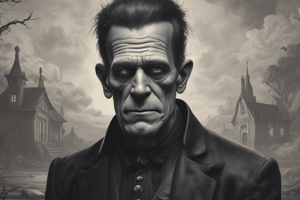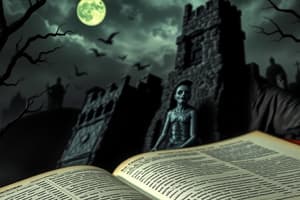Podcast
Questions and Answers
What does the dream symbolize according to the quote?
What does the dream symbolize according to the quote?
The dream is invented by the dreamer.
What does 'The Sublime' refer to?
What does 'The Sublime' refer to?
- A state of confusion
- Excellence, grandeur, or beauty (correct)
- A philosophical theory
- A type of narrative structure
What is the fundamental theme of Goethe's 'The Sorrows of Young Werther'?
What is the fundamental theme of Goethe's 'The Sorrows of Young Werther'?
The struggle for self-fulfillment against societal constraints.
What does the creature learn from Plutarch's 'Lives'?
What does the creature learn from Plutarch's 'Lives'?
What strong feelings does Milton's 'Paradise Lost' evoke in the creature?
What strong feelings does Milton's 'Paradise Lost' evoke in the creature?
What does the term 'Angel of the House' represent?
What does the term 'Angel of the House' represent?
Why did Victor go to the Orkney Islands?
Why did Victor go to the Orkney Islands?
What year was Mary Shelley born?
What year was Mary Shelley born?
When was Frankenstein first published?
When was Frankenstein first published?
What significant event happened to Mary Shelley shortly after her birth?
What significant event happened to Mary Shelley shortly after her birth?
What did William Godwin condemn in his work 'An Enquiry Concerning Political Justice'?
What did William Godwin condemn in his work 'An Enquiry Concerning Political Justice'?
What did Mary Wollstonecraft argue for in 'A Vindication of the Rights of Woman'?
What did Mary Wollstonecraft argue for in 'A Vindication of the Rights of Woman'?
What happened to Mary Shelley’s first child?
What happened to Mary Shelley’s first child?
What is the first theatre adaptation of Frankenstein?
What is the first theatre adaptation of Frankenstein?
What inspired the idea for Frankenstein?
What inspired the idea for Frankenstein?
What major life event occurred to Percy Shelley in 1822?
What major life event occurred to Percy Shelley in 1822?
How is Gothic literature related to the Enlightenment?
How is Gothic literature related to the Enlightenment?
What does Freud describe as the nature of the 'double'?
What does Freud describe as the nature of the 'double'?
Who stated that Victor's presumption was an unnatural attempt?
Who stated that Victor's presumption was an unnatural attempt?
What does the term 'Masculine Egotism' refer to in relation to Frankenstein?
What does the term 'Masculine Egotism' refer to in relation to Frankenstein?
What was the context for writing Frankenstein?
What was the context for writing Frankenstein?
What did Shelley think about her education?
What did Shelley think about her education?
What significant practice became common in the early 1800s regarding corpses?
What significant practice became common in the early 1800s regarding corpses?
Mary Shelley refers to improving herself through talking with her husband, Percy, and his ______ mind.
Mary Shelley refers to improving herself through talking with her husband, Percy, and his ______ mind.
Flashcards are hidden until you start studying
Study Notes
Mary Shelley's Life Timeline
- Born in 1797 to William Godwin and Mary Wollstonecraft, who died shortly after childbirth.
- Eloped with Percy Bysshe Shelley in 1814; faced personal tragedies, including the death of her first child in 1815.
- The concept for Frankenstein emerged during a summer spent in Lake Geneva in 1816 during a ghost story competition.
- Published Frankenstein in 1818 and released a revised edition with a new introduction in 1831.
- Experience significant personal loss; her husband Percy drowned in 1822, and she faced multiple childbirth tragedies.
Key Works and Philosophies of Influential Figures
- William Godwin’s An Enquiry Concerning Political Justice (1793) criticized all human institutions as corrupt.
- Mary Wollstonecraft's A Vindication of the Rights of Woman (1792) argued for women's rational education and condemned excessive sensibility.
Themes of Birth and Death
- Birth and death were intertwined in Shelley's life, witnessing the deaths of her mother and several children.
- Her experiences influenced her views on creation and loss, depicted in Frankenstein.
Rise of Gothic Fiction
- Gothic literature arose as a reaction against Enlightenment rationalism and science, emphasizing emotional experiences and supernatural elements.
Impact of Frankenstein on Gothic Literature
- The novel shifted Gothic focus inward, emphasizing personal evil and psychological divisions, introducing the theme of the double.
Interpretations of Shelley’s Monster
- Critics like Anne Mellor theorize that the monster symbolizes the French Revolution's failure, born from noble intentions but leading to chaos.
- The “life-principle” debate highlighted tensions between metaphysical and materialist views of life in early 19th-century science.
Galvanism and the Quest for Understanding Life
- Giovanni Aldini’s experiments in galvanism displayed the potential for reanimation, raising ethical questions about life and death.
Moral Themes in Frankenstein
- Percy Shelley noted the novel presents societal responsibility in the creation of monsters; societal neglect leads to malevolence.
- Contrasts notions of creator and creation, emphasizing the repercussions of neglect and abuse.
Gender Roles and Critiques
- The novel critiques patriarchal structures, with scholars identifying Victor's failings as extensions of male egotism and domestic ideals.
- Criticisms emphasize how characters reflect societal expectations of women as passive figures.
Tragic Hero and Hubris
- Victor Frankenstein embodies the tragic hero, marked by noble ambition, catastrophic downfall, and a profound tragic flaw—his abandonment of the creature.
Social and Historical Context
- The story reflects early 19th-century societal norms, especially regarding gender roles and domesticity, underscoring the tensions in education and authority.
Influences on the Monster's Development
- Shelley incorporated ideas from Locke and Rousseau, emphasizing the role of experience in shaping identity while critiquing social and moral constructs.
The Sublime and Psychological Depth
- Themes of the sublime permeate the narrative, reflecting both awe and terror in the human condition, amplified by characters' existential struggles.
Literary Influences on Shelley
- Works like Coleridge’s The Rime of the Ancient Mariner and Goethe’s exploration of Romantic isolation informed the thematic development of Frankenstein.
- Milton's Paradise Lost significantly influenced the creature’s self-identification with both Adam and Satan, emphasizing themes of creation and rejection.
Significance of Location
- The Orkney Islands served as a stark backdrop for pivotal moments in the narrative, highlighting isolation and the monstrous creation process.
Social Critique and Revolutionary Themes
- Godwin and Wollstonecraft’s revolutionary stance towards marriage and traditional roles informed Shelley's romantic associations and philosophical leanings.
Death and Anatomy in the Early 19th Century
- The demand for cadavers in medical training led to grave robbing and morally questionable practices, portrayed in the context of ethical dilemmas present in Frankenstein.
The Angel of the House
- Represents the idealized, submissive female role within the novel, reflecting the limitations placed on women during the Gothic and Victorian periods.
Dreams and Psychological Exploration
- Dreams are significant in Gothic fiction; serve to unveil inner psychological states and contribute to character motivations throughout Frankenstein.
Studying That Suits You
Use AI to generate personalized quizzes and flashcards to suit your learning preferences.




